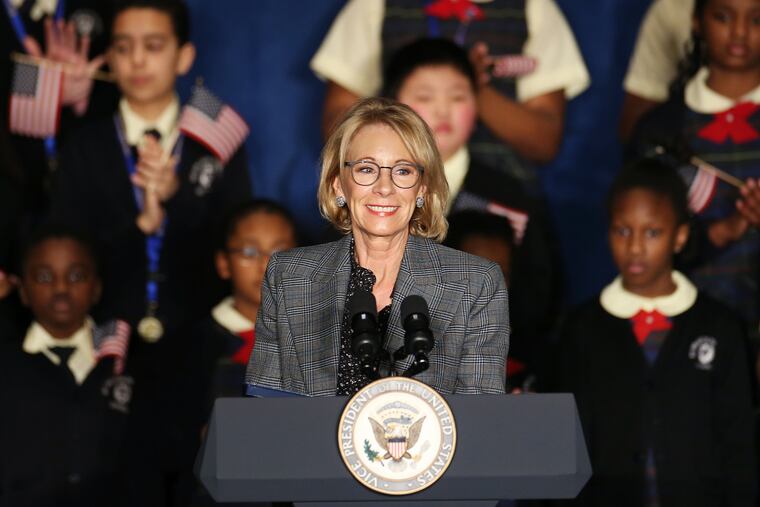Betsy DeVos finds new pot of cash to push education agenda: federal coronavirus relief money
"The current disruption to the normal model is reaffirming something I have said for years: We must rethink education to better match the realities of the 21st century," the Education Secretary says.

Education Secretary Betsy DeVos has found a new pot of cash with which to pursue her school "choice" agenda: money from the $2 trillion coronavirus relief package Congress passed to boost the economy as it deals with the pandemic.
DeVos, who has made it her top priority as education secretary to find alternatives to traditional public school districts, announced this week that she is starting a competition for states to apply for "rethinking" education grants.
“The current disruption to the normal model is reaffirming something I have said for years: We must rethink education to better match the realities of the 21st century,” she said in the announcement. “This is the time for local education leaders to unleash their creativity and ingenuity, and I’m looking forward to seeing what they do to provide education freedom and economic opportunity for America’s students.”
The Michigan billionaire has in the past been clear about her views of traditional public schools, referring to them as “a monopoly” and a “dead end.” She has advocated for decades for the expansion of charter schools — which are publicly funded but privately operated — as well as for voucher and similar programs that use taxpayer money for private and religious school education. She is also an enthusiast of virtual learning, and has supported online cyber charters, despite research showing that many enrolled students have poor educational outcomes.
Congress allocated $30.75 billion in its recent coronavirus relief legislation, known as the Cares Act, for an Education Stabilization Fund. It is intended to help states, K-12 school districts and higher education systems respond to the pandemic, which forced most schools to close and turn to remote education. Within that fund, it set aside $308 million in emergency education relief "for grants to states with the highest coronavirus burden."
DeVos is using $180 million of that money for her "Rethink K-12 Education Models Grant" program that invites states to find "new innovative ways for students to access K-12 education." (She is also spending an additional $127.5 million for a grant competition to reimagine workforce preparation.)
The "three absolute priorities" guiding the K-12 grant competition reflect the DeVos education agenda to expand alternatives to traditional public school districts.
Rep. Rosa DeLauro, D-Conn., chairwoman of the House subcommittee that funds the Education Department, slammed DeVos for pursuing her agenda with coronavirus relief money.
"I am astonished to see Secretary DeVos use [her] invitation to applicants for this critical aid to fund divisive, ideologically-driven policy priorities, including voucherlike proposals," said DeLauro. "At best, the secretary is exploiting emergency relief legislation to insert secretarial priorities not outlined in this section of the Cares Act. At worst, the secretary is deliberately misreading the law to conjure up purposes for these resources that were not provided in . . . the law."
The first priority spelled out in the Rethink K-12 Education Model grant application notice are "Continued Learning Parent Microgrants," which, would give money to families so they can "access high-quality remote learning options."Those options can be public or private schools or providers.
The "microgrants" sound similar to vouchers, which DeVos and President Trump support. They have asked Congress for $5 billion to fund a tax-credit program that would benefit companies and individuals who contribute so that families can use tax dollars for private schools. Legislators have shown no interest in such a program.
The second "absolute priority" under which states can apply for a grant is to develop and/or expand a "high-quality" statewide virtual school or a course-access program that would let students choose courses from different providers. Those course providers can be from any public school or "third-party" providers, it says.
The third priority calls for states to "propose their own educational strategies . . . to address the specific educational needs of their states, as related to remote learning." It is unclear exactly what kind of strategies are acceptable.
The application notice describes a complicated process by which the department will decide which states have the highest coronavirus burden, which include an analysis of how the state has used its "assets and collaborative efforts" in its coronavirus response and a signed commitment from the governor that he/she supports the application.
The news release on the department’s website has a headline that is a mouthful: “Secretary DeVos Launches New Grant Competition to Spark Student-Centered, Agile Learning Opportunities to Support Recovery from National Emergency,” but the message is simple: More alternatives to public school districts.